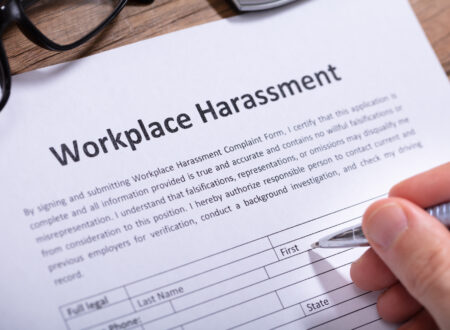- As with an anti-harassment policy, the complaint procedure process should focus on what is prohibited, even if it is not unlawful.
- The anti-harassment policy and complaint procedure should apply to racial, ethnic, religious, and other forms of harassing conduct, not just sexual harassment.
- At a minimum, employees should be given the opportunity to consult with supervisors or HR.
- If an employer uses an external (third party source) reporting method, consider to whom the external reports will be communicated to internally.
- Employers are well-advised to ensure that complaints made externally are reported to multiple people internally.
- There are three key points:
- The conduct giving rise to the complaint can occur not only in the workplace but also at company-sponsored business and social events. The policy and complaint procedure should make it clear that it applies to events entirely unrelated to the workplace, such as an employee pursuing a romantic relationship with a co-worker by calling him/her at home (including texting and emails).
- The conduct giving rise to the complaint does not have to be filed by an employee. Employees may raise concerns about harassing behavior from customers, vendors, and suppliers.
- Harassment via social media, e-mail and text messages are all within the scope of prohibited conduct. A post on an employee’s private Facebook page can be cause for corrective action if it is regarding co-workers, business partners or customers.
- Consider these points:
- Do not limit the protection to complainants. It also applies to witnesses, others who are involved in the investigation and those associated with the complainant.
- The business should do more than prohibit retaliatory adverse employment actions, such as termination. Employers also prohibit retaliation in the form of material changes to the terms and conditions of employment, such as assignments, harassment, and retaliation independent of the workplace. An employer must be aware of the Federal Whistleblower Statute.
- The employer should spell out, in training and in investigations, that a complaint that does not have legal merit is not an excuse to engage in unlawful retaliation.
- The policy should make clear that prompt and proportionate corrective action will be taken if the company concludes that an employee or nonemployee has engaged in harassing conduct, even if the conduct is not unlawful.
Author(s)

Stuart J. Oberman, Esq.
Stuart J. Oberman is the founder and President of Oberman Law Firm. Mr. Oberman graduated from Urbana University and received his law degree from John Marshall Law School. Mr. Oberman has been practicing law for over 30 years, and before going into private practice, Mr. Oberman was in-house counsel for a Fortune 500 Company.
Read More =>





